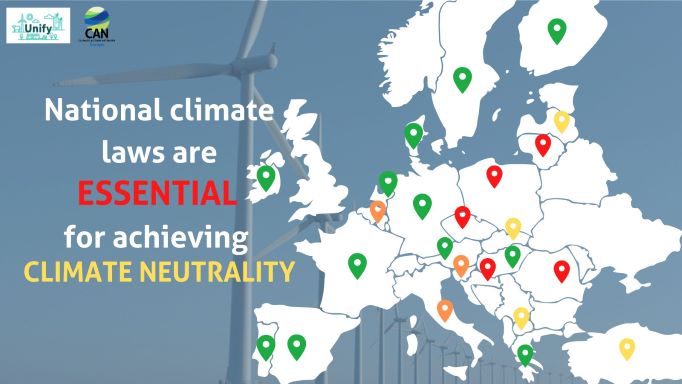A new report by CAN Europe, with the contribution of The Green Tank, assesses the progress and content of climate laws in 17 countries across Europe.
In 2021 the first European Climate Law was adopted, while in summer 2021 the European Commission presented a package of legislative proposals, known as the fit for 55 package, to bring EU climate and energy legislation into line with the new legally binding climate targets.
Civil society across Europe has understood the importance of climate laws including a sound governance framework that will facilitate achieving climate neutrality. This report, including input from 17 different countries has three goals:
- It provides easy access to information about the content and status of a climate law in any of the participating countries.
- It seeks to promote the need for more national accountability of the EU climate neutrality objective and the adoption of national economy-wide climate neutrality targets as well as a national governance enabling conditions to achieve it.
- It also showcases the successful array of governance mechanisms that already exist at national level and which could inspire improvements of the EU’s climate architecture and thereby accelerate implementation across the Union.
The participant countries are the following: Belgium, Bulgaria, Cyprus, Denmark, Estonia, France, Germany, Greece, Italy, Latvia, Luxembourg, North Macedonia, Portugal, Slovenia, Spain, Turkey, and the United Kingdom.
As far as Greece is concerned, the report notes that the draft of the first National Climate Law was submitted for a 2‑month public consultation on November 24, 2021 after being developed for approximately 6 months in the National Scientific Committee for Climate Change as well as a special law drafting Committee. However, to this date, it has not been brought to vote and we are still unaware when this will happen.
The draft law in its current content sets ambitious climate neutrality targets by 2050, as well as interim climate targets:
- At least 55% reduction in net greenhouse gas emissions by 2030 compared to 1990 levels
- At least 80% reduction in net greenhouse gas emissions by 2040 compared to 1990 levels
It also contains a detailed description for the development of a 5‑year sectoral carbon budgets for 7 sectors (electricity and heat production, industry, transport, agriculture, buildings, waste and LULUCF) which enable and facilitate the engagement of all sectors of the economy in achieving the climate targets (an absolute prerequisite), close monitoring of the progress or lack thereof and flexibility between sectors.
The law also explicitly commits to a phase out of lignite by 2028, heavy oil from the islands by 2030, as well as the gradual substitution of all fossil fuels (including gas) by renewables, albeit the latter without a specific timeline.
The report titled “Climate Laws in Europe” was published on May 4, 2022. It is available here.



















































































































































































































































































































